Unit 11 How was your school trip? Section A Grammar focus - 3b课件(31张PPT)
文档属性
| 名称 | Unit 11 How was your school trip? Section A Grammar focus - 3b课件(31张PPT) | 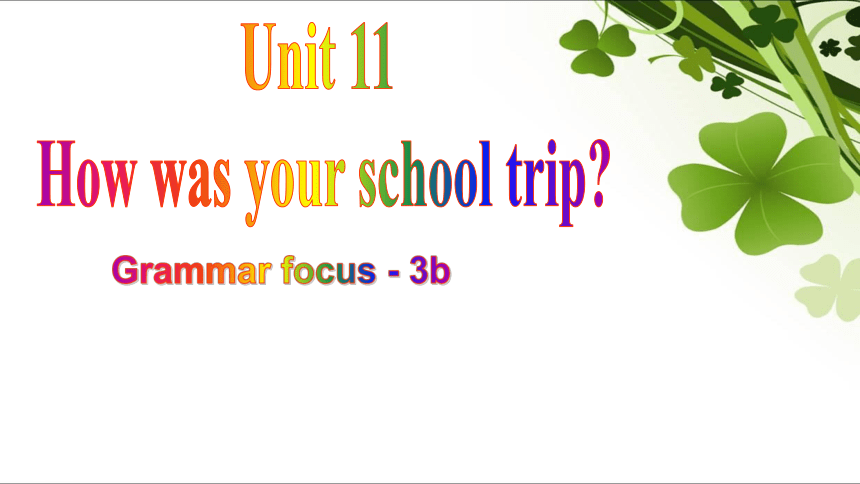 | |
| 格式 | pptx | ||
| 文件大小 | 1.9MB | ||
| 资源类型 | 教案 | ||
| 版本资源 | 人教新目标(Go for it)版 | ||
| 科目 | 英语 | ||
| 更新时间 | 2021-05-04 07:20:25 | ||
图片预览

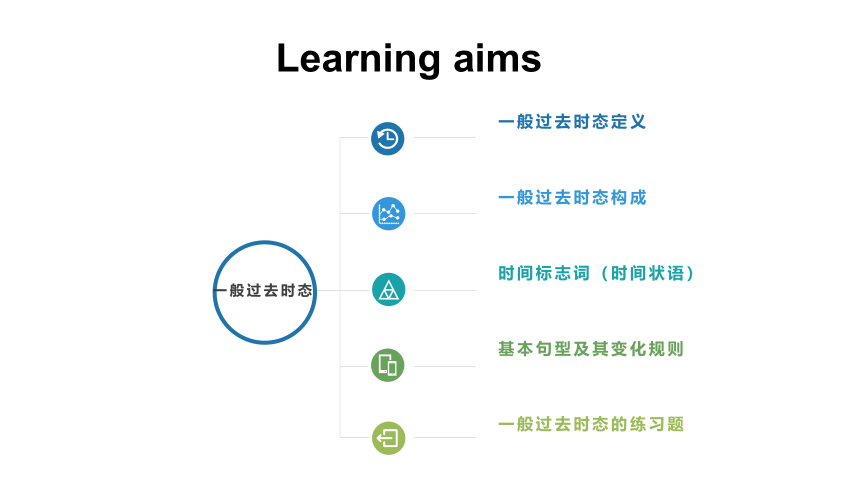
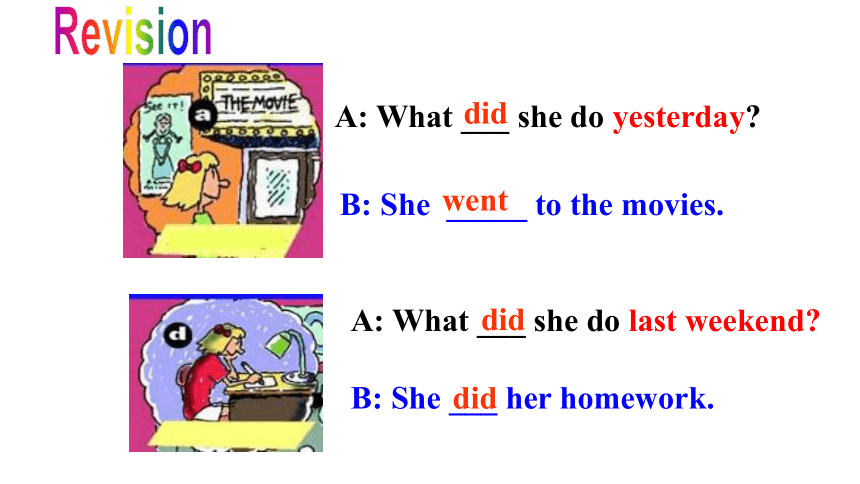

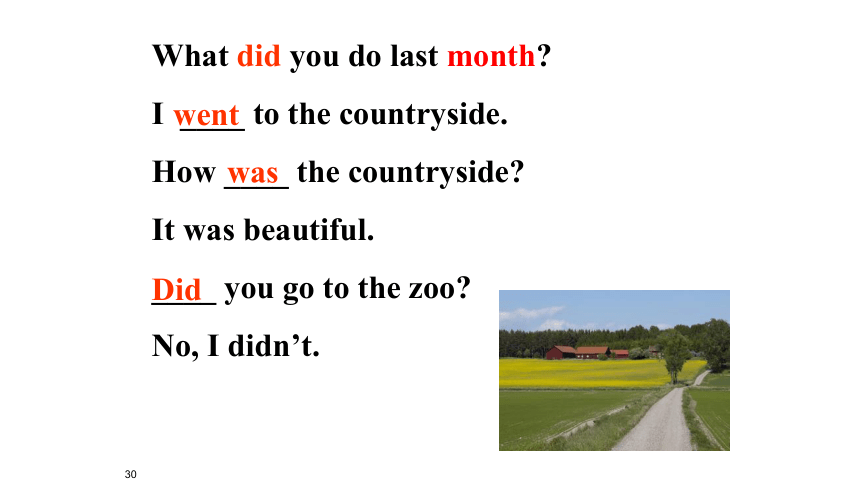
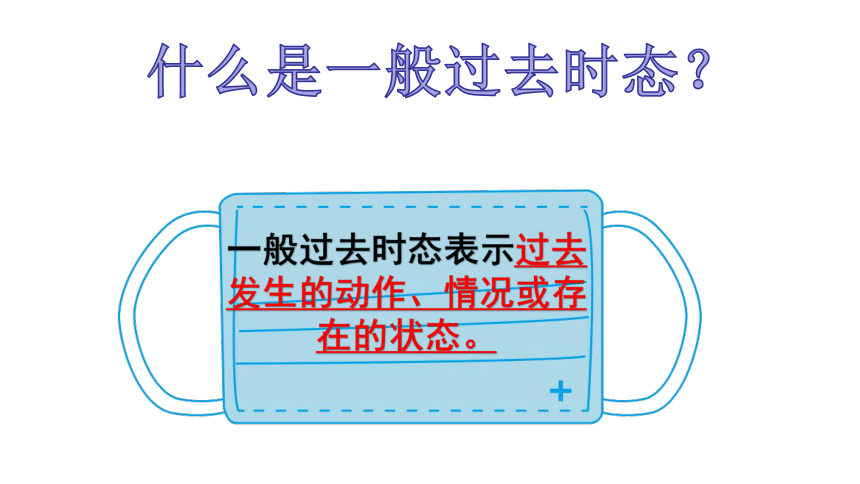
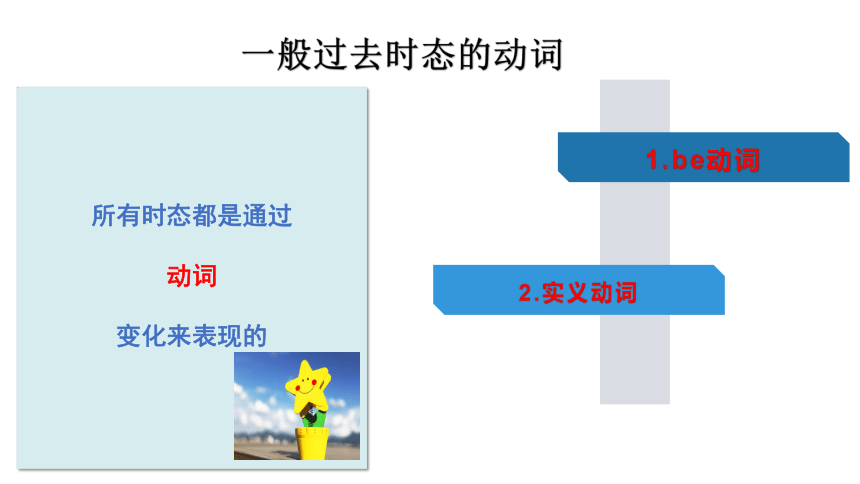
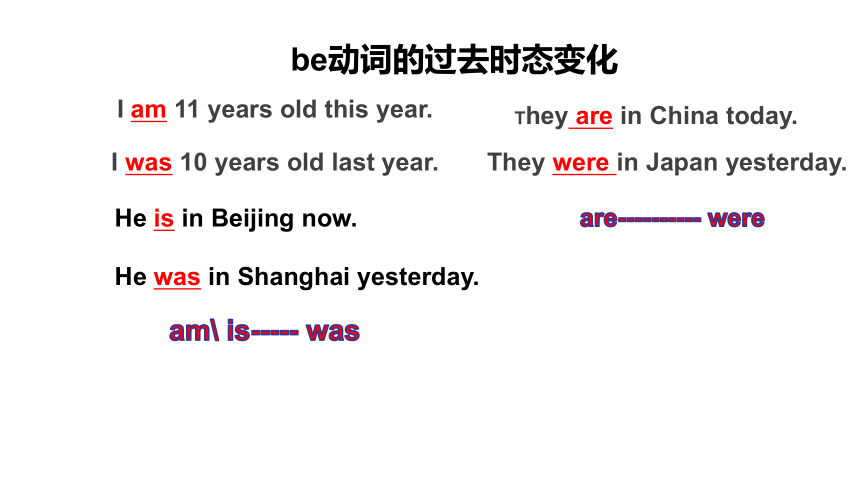

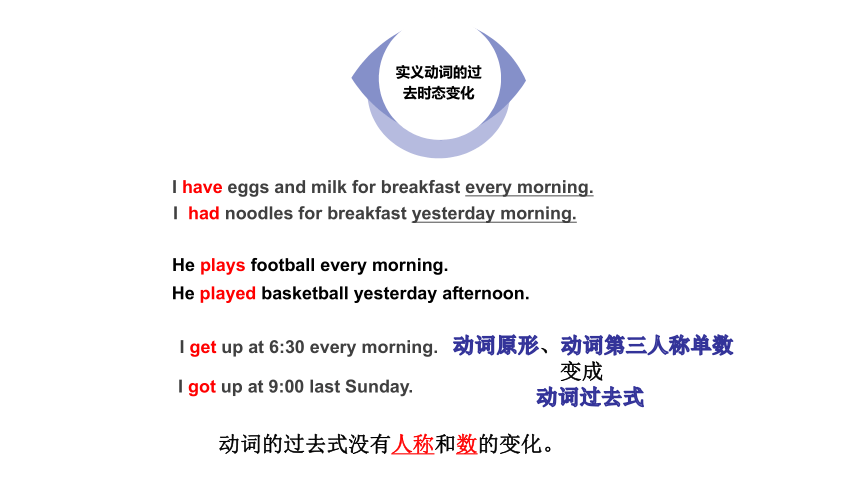
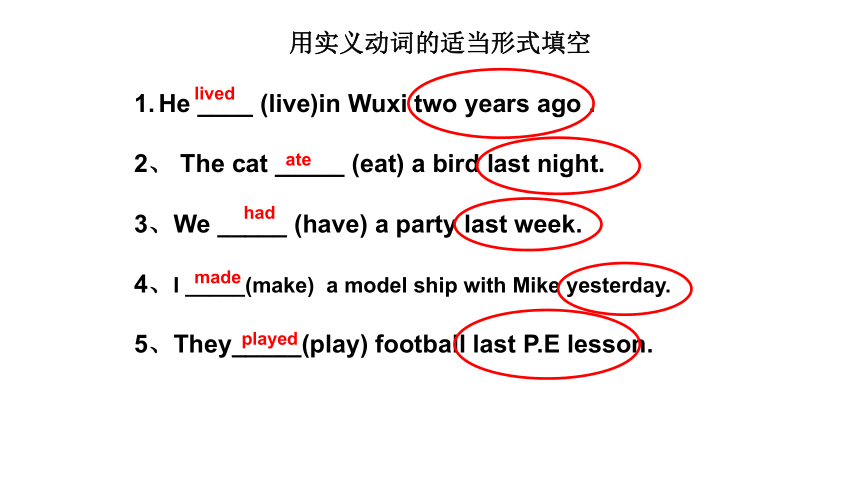

文档简介
Unit 11
How was your school trip?
Grammar focus - 3b
Learning aims
一般过去时态
一般过去时态定义
基本句型及其变化规则
一般过去时态的练习题
时间标志词(时间状语)
一般过去时态构成
B: She _____ to the movies.
A: What ___ she do yesterday?
did
went
A: What ___ she do last weekend?
B: She ___ her homework.
did
did
Revision
-What did they ___ last weekend?
-They ______________________
do
picked some strawberries.
-How ____ the strawberries?
-They were delicious.
were
What did you do last month?
I ____ to the countryside.
How ____ the countryside?
It was beautiful.
____ you go to the zoo?
No, I didn’t.
went
was
Did
30
什么是一般过去时态?
一般过去时态表示过去发生的动作、情况或存在的状态。
所有时态都是通过
动词
变化来表现的
1.be动词
2.实义动词
一般过去时态的动词
I am 11 years old this year.
They are in China today.
be动词的过去时态变化
I was 10 years old last year.
They were in Japan yesterday.
He is in Beijing now.
He was in Shanghai yesterday.
are---------- were
am\ is----- was
用be动词的适当形式填空
I ____ an English teacher .
2、 She _____ happy yesterday.
3、They _____ glad to see each other last month.
4、Helen and Nancy _____ good friends.
5、The little dog _____ two years old this year.
am
was
were
are
is
I have eggs and milk for breakfast every morning.
I got up at 9:00 last Sunday.
实义动词的过去时态变化
I had noodles for breakfast yesterday morning.
I get up at 6:30 every morning.
He plays football every morning.
He played basketball yesterday afternoon.
动词原形、动词第三人称单数
变成
动词过去式
动词的过去式没有人称和数的变化。
用实义动词的适当形式填空
He ____ (live)in Wuxi two years ago .
2、 The cat _____ (eat) a bird last night.
3、We _____ (have) a party last week.
4、I _____(make) a model ship with Mike yesterday.
5、They_____(play) football last P.E lesson.
lived
ate
had
made
played
“last一家”
last night
last week
last month
last Monday
“...... ago”-------...以前
two minutes ago
three hours ago
five days ago
“yesterday一家”
yesterday morning
yesterday afternoon
yesterday evening
the day before yesterday
03
01
02
时间标志词(时间状语)
03
03
04
05
“that 连用”
that morning
that day
that winter
“其他”
in 1980
in the past
just now
How was your school trip?
It was great!
Did you go to the zoo?
No, I didn’t. I went to a farm.
Did you see any cows?
Yes, I did. I saw quite a lot.
Did Carol ride a horse?
No, she didn’t. But she milked a cow.
Were the strawberries good?
Yes, they were. / No, they weren’t.
Grammar
Focus
Guess the past tense verbs.
主语+动词过去式+其他
肯定句
I was a teacher last year.
He played football in the park yesterday.
She was happy yesterday.
否定式
be动词
实义动词
在be动词后加 not
was not=wasn't
were not= weren't
主语+didn't+动词原形+其他。
在动词原形前加助动词did
did not=didn't
主语+wasn't+其他。
主语+weren't+其他。
I told them the news yesterday.
I didn't tell them the news yesterday.
She wasn't happy yesterday.
一般疑问句
be动词
实义动词
把was\were 提到句首
Did+主语+动词原形+其他?
在句首加助动词did
(遇助动词,动词现原形)
Was\Were+主语+其他?
They finished their work yesterday.
Did they finish their work yesterday?
Yes,they did
No, they didn't
She was happy yesterday.
Was she happy yesterday?
Yes ,she was
No, she wasn't
句子中加助动词did 后,动词需要返回原形。
1、Did he went to school yesterday?
2、Did he play football yesterday?
F
T
特殊疑问句
be动词
实义动词
特殊疑问词+一般疑问句
疑问词+was\were+主语+其他?
特殊疑问词+一般疑问句
疑问词+did+主语+V.原+其他?
They finished their work yesterday.
What did they do yesterday?
They finished their work yesterday.
When did they finish their work?
He was a teacher.
What was his job?
There was a car in front of the house just now.
否定句:______________________________
一般疑问句:__________________________
肯定回答:__________________ 否定回答:_____________________
They played football in the playground.
否定句:__________________________
一般疑问句:_____________________________
肯定回答:_______________ 否定回答:____________________
特殊疑问句:_____________________________
There wasn't a car in front of the house just now.
Was there a car in front of the house just now?
Yes, there was
No,there wasn't
They didn't play football in the playground.
Did they play football in the playground?
Yes , they did
No, they didn't
What did they do in the playground?
句型转换
The children had a good time in the park.
否定句:
一般疑问句:
对划线部分提问:
The children didn't have a good time in the park.
Did the children have a good time in the park?
Where did the children have a good time?
pick
visit
watch
climb
study
worry
play
live
stop
写出下列动词的过去式
go
ride
do
is
are
have
eat
buy
see
went
rode
did
was
were
had
ate
bought
saw
picked
visited
watched
climbed
studied
worried
played
lived
stopped
一般在
动词原
形末尾加-ed
辅音字母+y”的动词,
先变“y”为“ i”再加ed
结尾是e的动词加-d
末尾只有一个辅音字母
的重读闭音节词,先双
写这 个辅音字母,再加-ed
Irregular verbs (不规则动词)
{5C22544A-7EE6-4342-B048-85BDC9FD1C3A}原形
过去式
am/is
was
are
were
bring
brought
buy
bought
come
came
cut
cut
does/do
did
P141
Dear Bill,
How ____(is) your school trip yesterday? ____(Do) you ____(go) to the zoo? ____(do) you take any photos? ____(Do) you ____(see) any interesting animals? I ____(go) to the zoo last year and it ____(is) a lot of fun.
Jim
was
Did
go
Did
Did
see
went
was
3a. Complete Jim’s letter on the left and Bill’s reply on the right.
reply 回应,答复
Dear Jim,
My school trip ____ (is) great! We ____ (have) so much fun! We ____(go) to Green Park. We ______ (climb) the mountains there and ____(see) a lot of flowers. We ____(eat) our lunch under some trees and ______(play) some games after that. But at about two o’clock, it ____(get) very cloudy and we _______(worry) it would rain. Luckily, it _____(do not), and the sun _____(come) out again!
Bill
was
had
went
climbed
saw
ate
played
got
worried
didn’t
came
1. worry的用法小结
(1) worry可作及物动词,意为“使烦恼,使担心”,常接人作宾语。
…and we worried it would rain.我们担心天会下雨。
(2) worry也可作不及物动词,意为“担心,烦恼”,接宾语时常跟介词about, 即worry about sb./sth.“担心某人/某事(物)”。
Don't worry about me! 不要为我担心。
(3) worry的形容词形式为worried, 意为“担忧的,焦虑的”,常用结构be/get worried about, 相当于worry about.
Some students are very worried about their study.一些学生对学习忧虑重重。
2.luckily
luckily是副词,意为“幸运地,幸亏,侥幸”。例如:
Luckily there was a doctor on the spot.
幸运的是现场有一位医生。
拓展:
lucky是luckily的形容词形式,意为“幸运的, 吉祥的, 侥幸的”。例如:
He is a lucky dog. 他是个幸运的家伙。
luck是luckily的名词形式,是不可数名词;意为“运气, 好运, 幸运 ”。good luck to sb表示“祝某人好运”。例如:
I wish you luck =Good luck to you! 祝你好运!
come out
1.出来
It's OK, you can come out now. They've gone away.(好了,你现在可以出来了。他们已经走了。)
2. 出版,发行
That magazine comes out once a month. 那个杂志每月出版一期。
3.显露
Her best qualities come out in a crisis. 在危急关头显露出了她的优秀品质。
The sun came out again!
太阳又出来了
Make up a story. Each student adds a sentence.
3b
The weather was beautiful.
We went fishing.
Last week I visited my aunt’s house.
Activity
Make up a story
Last weekend I ...
We ...
1. 表示过去某个时间发生的动作或
存在的状态。
2. 表示过去经常或反复发生的动作。
yesterday
last night/week/time..
… days ago
On Sunday morning
一般
过去时
用法
过去式的构成
常用时间
一般在动词原形末尾加-ed
辅音字母+y”的动词,先变“y”为“ i”再加ed
结尾是e的动词加-d
末尾只有一个辅音字母的重读闭音节词,先双写这 个辅音字母,再加-ed
Summary
Homework
1.背诵Grammar Focus.
2.完成课时练习
How was your school trip?
Grammar focus - 3b
Learning aims
一般过去时态
一般过去时态定义
基本句型及其变化规则
一般过去时态的练习题
时间标志词(时间状语)
一般过去时态构成
B: She _____ to the movies.
A: What ___ she do yesterday?
did
went
A: What ___ she do last weekend?
B: She ___ her homework.
did
did
Revision
-What did they ___ last weekend?
-They ______________________
do
picked some strawberries.
-How ____ the strawberries?
-They were delicious.
were
What did you do last month?
I ____ to the countryside.
How ____ the countryside?
It was beautiful.
____ you go to the zoo?
No, I didn’t.
went
was
Did
30
什么是一般过去时态?
一般过去时态表示过去发生的动作、情况或存在的状态。
所有时态都是通过
动词
变化来表现的
1.be动词
2.实义动词
一般过去时态的动词
I am 11 years old this year.
They are in China today.
be动词的过去时态变化
I was 10 years old last year.
They were in Japan yesterday.
He is in Beijing now.
He was in Shanghai yesterday.
are---------- were
am\ is----- was
用be动词的适当形式填空
I ____ an English teacher .
2、 She _____ happy yesterday.
3、They _____ glad to see each other last month.
4、Helen and Nancy _____ good friends.
5、The little dog _____ two years old this year.
am
was
were
are
is
I have eggs and milk for breakfast every morning.
I got up at 9:00 last Sunday.
实义动词的过去时态变化
I had noodles for breakfast yesterday morning.
I get up at 6:30 every morning.
He plays football every morning.
He played basketball yesterday afternoon.
动词原形、动词第三人称单数
变成
动词过去式
动词的过去式没有人称和数的变化。
用实义动词的适当形式填空
He ____ (live)in Wuxi two years ago .
2、 The cat _____ (eat) a bird last night.
3、We _____ (have) a party last week.
4、I _____(make) a model ship with Mike yesterday.
5、They_____(play) football last P.E lesson.
lived
ate
had
made
played
“last一家”
last night
last week
last month
last Monday
“...... ago”-------...以前
two minutes ago
three hours ago
five days ago
“yesterday一家”
yesterday morning
yesterday afternoon
yesterday evening
the day before yesterday
03
01
02
时间标志词(时间状语)
03
03
04
05
“that 连用”
that morning
that day
that winter
“其他”
in 1980
in the past
just now
How was your school trip?
It was great!
Did you go to the zoo?
No, I didn’t. I went to a farm.
Did you see any cows?
Yes, I did. I saw quite a lot.
Did Carol ride a horse?
No, she didn’t. But she milked a cow.
Were the strawberries good?
Yes, they were. / No, they weren’t.
Grammar
Focus
Guess the past tense verbs.
主语+动词过去式+其他
肯定句
I was a teacher last year.
He played football in the park yesterday.
She was happy yesterday.
否定式
be动词
实义动词
在be动词后加 not
was not=wasn't
were not= weren't
主语+didn't+动词原形+其他。
在动词原形前加助动词did
did not=didn't
主语+wasn't+其他。
主语+weren't+其他。
I told them the news yesterday.
I didn't tell them the news yesterday.
She wasn't happy yesterday.
一般疑问句
be动词
实义动词
把was\were 提到句首
Did+主语+动词原形+其他?
在句首加助动词did
(遇助动词,动词现原形)
Was\Were+主语+其他?
They finished their work yesterday.
Did they finish their work yesterday?
Yes,they did
No, they didn't
She was happy yesterday.
Was she happy yesterday?
Yes ,she was
No, she wasn't
句子中加助动词did 后,动词需要返回原形。
1、Did he went to school yesterday?
2、Did he play football yesterday?
F
T
特殊疑问句
be动词
实义动词
特殊疑问词+一般疑问句
疑问词+was\were+主语+其他?
特殊疑问词+一般疑问句
疑问词+did+主语+V.原+其他?
They finished their work yesterday.
What did they do yesterday?
They finished their work yesterday.
When did they finish their work?
He was a teacher.
What was his job?
There was a car in front of the house just now.
否定句:______________________________
一般疑问句:__________________________
肯定回答:__________________ 否定回答:_____________________
They played football in the playground.
否定句:__________________________
一般疑问句:_____________________________
肯定回答:_______________ 否定回答:____________________
特殊疑问句:_____________________________
There wasn't a car in front of the house just now.
Was there a car in front of the house just now?
Yes, there was
No,there wasn't
They didn't play football in the playground.
Did they play football in the playground?
Yes , they did
No, they didn't
What did they do in the playground?
句型转换
The children had a good time in the park.
否定句:
一般疑问句:
对划线部分提问:
The children didn't have a good time in the park.
Did the children have a good time in the park?
Where did the children have a good time?
pick
visit
watch
climb
study
worry
play
live
stop
写出下列动词的过去式
go
ride
do
is
are
have
eat
buy
see
went
rode
did
was
were
had
ate
bought
saw
picked
visited
watched
climbed
studied
worried
played
lived
stopped
一般在
动词原
形末尾加-ed
辅音字母+y”的动词,
先变“y”为“ i”再加ed
结尾是e的动词加-d
末尾只有一个辅音字母
的重读闭音节词,先双
写这 个辅音字母,再加-ed
Irregular verbs (不规则动词)
{5C22544A-7EE6-4342-B048-85BDC9FD1C3A}原形
过去式
am/is
was
are
were
bring
brought
buy
bought
come
came
cut
cut
does/do
did
P141
Dear Bill,
How ____(is) your school trip yesterday? ____(Do) you ____(go) to the zoo? ____(do) you take any photos? ____(Do) you ____(see) any interesting animals? I ____(go) to the zoo last year and it ____(is) a lot of fun.
Jim
was
Did
go
Did
Did
see
went
was
3a. Complete Jim’s letter on the left and Bill’s reply on the right.
reply 回应,答复
Dear Jim,
My school trip ____ (is) great! We ____ (have) so much fun! We ____(go) to Green Park. We ______ (climb) the mountains there and ____(see) a lot of flowers. We ____(eat) our lunch under some trees and ______(play) some games after that. But at about two o’clock, it ____(get) very cloudy and we _______(worry) it would rain. Luckily, it _____(do not), and the sun _____(come) out again!
Bill
was
had
went
climbed
saw
ate
played
got
worried
didn’t
came
1. worry的用法小结
(1) worry可作及物动词,意为“使烦恼,使担心”,常接人作宾语。
…and we worried it would rain.我们担心天会下雨。
(2) worry也可作不及物动词,意为“担心,烦恼”,接宾语时常跟介词about, 即worry about sb./sth.“担心某人/某事(物)”。
Don't worry about me! 不要为我担心。
(3) worry的形容词形式为worried, 意为“担忧的,焦虑的”,常用结构be/get worried about, 相当于worry about.
Some students are very worried about their study.一些学生对学习忧虑重重。
2.luckily
luckily是副词,意为“幸运地,幸亏,侥幸”。例如:
Luckily there was a doctor on the spot.
幸运的是现场有一位医生。
拓展:
lucky是luckily的形容词形式,意为“幸运的, 吉祥的, 侥幸的”。例如:
He is a lucky dog. 他是个幸运的家伙。
luck是luckily的名词形式,是不可数名词;意为“运气, 好运, 幸运 ”。good luck to sb表示“祝某人好运”。例如:
I wish you luck =Good luck to you! 祝你好运!
come out
1.出来
It's OK, you can come out now. They've gone away.(好了,你现在可以出来了。他们已经走了。)
2. 出版,发行
That magazine comes out once a month. 那个杂志每月出版一期。
3.显露
Her best qualities come out in a crisis. 在危急关头显露出了她的优秀品质。
The sun came out again!
太阳又出来了
Make up a story. Each student adds a sentence.
3b
The weather was beautiful.
We went fishing.
Last week I visited my aunt’s house.
Activity
Make up a story
Last weekend I ...
We ...
1. 表示过去某个时间发生的动作或
存在的状态。
2. 表示过去经常或反复发生的动作。
yesterday
last night/week/time..
… days ago
On Sunday morning
一般
过去时
用法
过去式的构成
常用时间
一般在动词原形末尾加-ed
辅音字母+y”的动词,先变“y”为“ i”再加ed
结尾是e的动词加-d
末尾只有一个辅音字母的重读闭音节词,先双写这 个辅音字母,再加-ed
Summary
Homework
1.背诵Grammar Focus.
2.完成课时练习
同课章节目录
- Unit 1 Can you play the guitar?
- Section A
- Section B
- Unit 2 What time do you go to school?
- Section A
- Section B
- Unit 3 How do you get to school?
- Section A
- Section B
- Unit 4 Don't eat in class.
- Section A
- Section B
- Unit 5 Why do you like pandas?
- Section A
- Section B
- Unit 6 I'm watching TV.
- Section A
- Section B
- Review of Units 1-6
- Unit 7 It's raining!
- Section A
- Section B
- Unit 8 Is there a post office near here?
- Section A
- Section B
- Unit 9 What does he look like?
- Section A
- Section B
- Unit 10 I'd like some noodles.
- Section A
- Section B
- Unit 11 How was your school trip?
- Section A
- Section B
- Unit 12 What did you do last weekend?
- Section A
- Section B
